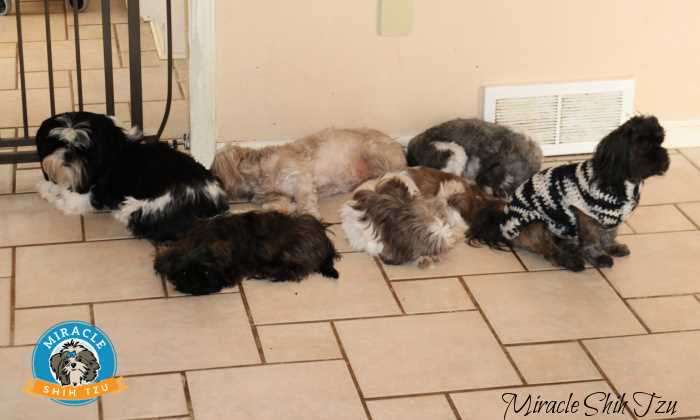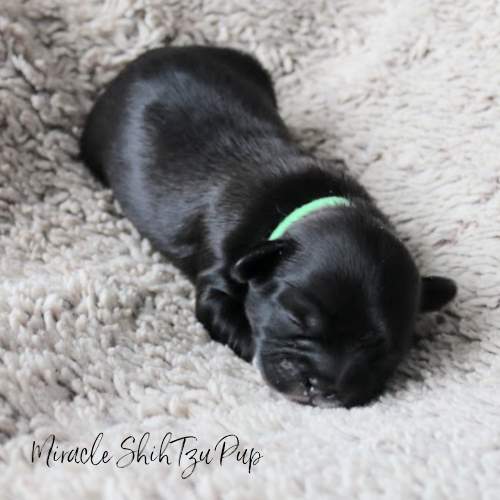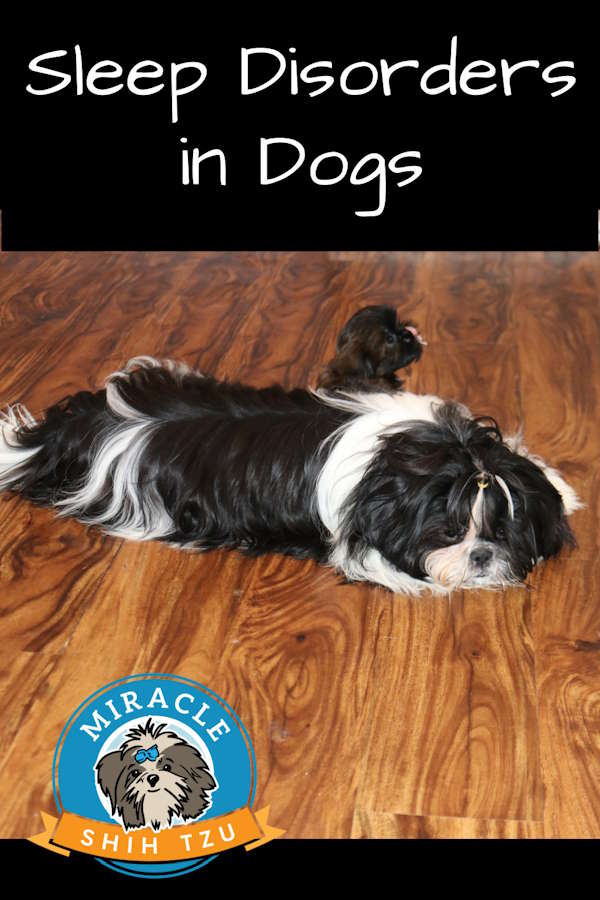Your Guide to Sleep Disorders in Dogs
Sleep Disorders in Dogs by Amelia Palmer
We so often think of our dogs as being part of the family. In truth, they’re a lot more like us than we know. They can suffer from some of the same problems that we do, including numerous different sleep disorders. Additionally, these issues can be as detrimental to their health as they would be to ours.
On average, your four-legged family member should be getting about 13 hours of sleep a day. This includes their morning and afternoon naps, as well as a solid 8-10 hours at night.
 Sleep Disorders in Dogs
Sleep Disorders in DogsJust think about how you feel when your alarm goes off super early, and you’ve only had a couple of hours of shut-eye!
If your dog is having trouble sleeping, it can lead to numerous issues such as a compromised immune system, aggression or behavioral problems, stress, and anxiety. This is why it’s vital you know how to spot the signs that your pooch might be pooped.
If you identify a problem, now’s not the time to let sleeping dogs lie!
Sleep Disorders in Dogs
Genetic Disorders
Narcolepsy is remarkably common in dogs and will mostly show up as a disorder when they’re still a young pup. It’s caused by the brain creating too little hypocretin. Hypocretin is the hormone that keeps us alert and helps our brain with our Circadian rhythm
When you have narcolepsy – both a human and a dog – your body essentially collapses because the hypocretin level drops too low, and your mind can no longer stay alert. In dogs, you usually see the collapse shortly after getting excited, like when you come home, or when they’re given a new toy at playtime.
Narcolepsy is a genetic disorder that’s inherent in your dog, and there is no cure. However, there are ways to manage the problem. Immune system issues, obesity, and long periods of inactivity, followed by exercise, can exacerbate the condition. So make sure to keep your little furry friend properly exercised and at a healthy weight.
If you think your dog has this condition, try to film an episode on your phone to show the vet what happens. Be sure to note how often the incidents occur and what may have triggered each one. This will help them determine the best treatment course and what action you’ll need to take. In the most severe cases, you may have to give them a pill to control the condition.
The good news is, your dog is not in pain or suffering when they have an episode. You can usually wake them quite easily from a narcoleptic event. We’ve found that waving a treat under their nose brings them around quite quickly!
Impact Of Obesity
Obesity is no joke in any animal. It can cause health problems, and sleep apnea is one of the major concerns for an overweight dog.
With this condition, your dog will stop breathing when they fall asleep and then jolt awake. In severe cases, they can jolt awake as quickly as 15 seconds after nodding off. This means that they get very little proper rest and struggle to have a good nights’ sleep.
Brachycephalic Syndrome
Sleep apnea is also common in brachycephalic breeds. These flat-faced breeds include your Shih Tzus, Bulldogs, Boxers, Pugs, and many Terriers. In brachycephalic dogs, the snout isn’t always properly developed, and they can have trouble breathing when awake, never mind when asleep.
Listen out for loud snoring regularly. If your pup is the No-Snorious B.I.G, this is a common sign that they have sleep apnea and may not be dozing properly. It’s important to get the condition diagnosed and get your vet to recommend a treatment plan. Sleep apnea can lead to serious, long-term problems and can even be life-threatening in severe cases that are left untreated.
Treatment for sleep apnea includes weight loss and strict diet control in obese dogs. Your pooch may even need surgery to fix constricted airways or incorrect formations in the snout. Additionally, steam humidifiers can be used in the room that your dog is sleeping in—this helps to soothe the airways and improve their ability to breathe consistently.
REM Behavior Disorder
It can be incredibly cute when your sleeping dog wags its tail or has a little bark at an unseen postman while in the land of nod. Happy paws twitching as they dream about running through fields and chasing bicycles are fun to watch. These dreams are quite normal and are nothing to worry about if they’re infrequent and only involve slight movements or sounds.
It’s when the movement becomes big and often happens that you may need to be concerned. Some dogs can even sleepwalk in the more advanced cases of REM behavior disorder. The worry with this is that they can hurt themselves by walking into things while running or trying to attack something in their dreams.
If your pup is prone to physical activity while asleep, monitor the situation closely, and talk to your vet if you think it’s getting too extreme. You should also try to film an episode to show your vet what it looks like.
If, after examining your dog, the vet feels that the disorder impacts the animal’s sleep, they may prescribe medication. It will help the dog to fall into a deeper sleep and be less prone to physical activity that they dream up.
Joint Pain Or Outside Aggravations
 Our floors are heated in the winter, which my Shih Tzu dogs seem to love. Sometimes, finding a warm place is all that is needed for a comfortable nap.
Our floors are heated in the winter, which my Shih Tzu dogs seem to love. Sometimes, finding a warm place is all that is needed for a comfortable nap.Insomnia is not very common in dogs, but when it does occur, it’s usually caused by some kind of aggravation to the body. As a dog gets older, it might have joint pain or arthritis. This can make it uncomfortable to curl up or stay in one position for too long – the same way it does for humans. Try talking to your vet about possible medication or supplements that you can give your dog to ease their pain and allow them to sleep longer.
Fleas or skin allergies are another aggravation that could prevent your dog from sleeping happily. The constant need to scratch will wake them up regularly. If you’re up to date on your de-flea routine and don’t see any pests while grooming, you may need to chat with your vet about skin allergies. They may be able to recommend a supplement. There will be a trial and error phase as you learn what works best to alleviate the issue.
Anxiety and stress are the other major factors in insomnia (we told you humans and their four-legged best friends are more alike than you knew!). The biggest problem with this is that the lack of sleep contributes to the mental and emotional issues, creating a vicious cycle. It’s essential to work out what is causing the initial problem and work on solving it.
Insomnia can cause a range of extra problems for your beloved pet. If you notice the signs, make sure you work quickly to find a solution so that the habit of not sleeping doesn’t become ingrained.
Start with increasing their exercise to help stimulate them mentally, tire them out physically, and relieve stress through more interactions with you. Changing their sleeping arrangement can also help, especially if there is a flea or allergy problem with the bedding. If all else fails, medication may be needed to help calm your dog.
Sleep Disorders in Dogs: Signs To Watch Out For
 Sleep disorders in dogs may have many different causes.
Sleep disorders in dogs may have many different causes.It’s not always easy to spot the signs of lack of sleep in a dog. They can’t answer if you ask how they slept! And some days, they might just need a little extra love and cuddles but are snoozing just fine. The key is to know your furry family member’s habits so that you can track when things change.
There are also a few signs to look out for if anything changes in your dog’s behavior:
- Snoring – We all have days when our sinuses are blocked or we slept funny, and that can lead to a loud snore at night. If your dog is doing this regularly, watch them closely when they sleep and see if they jolt or twitch from time to time. This could be them waking up suddenly due to sleep apnea.
- Moving when asleep – As we said before, a little wag of the tail or twitching of the feet while sleeping is nothing to be concerned about. However, more prominent movements on an ongoing basis could be signs of REM behavior disorder, which can lead to sleepwalking.
- Pacing or crying at night – If your dog refuses to settle and walks around the room at night, this could be a sign of insomnia. Some dogs also turn to whining and barking if they get frustrated at being unable to sleep. If it happens consistently, it’s time to explore if there’s a physical problem with your pooch or if there could be something wrong with their bedding.


Newborns and young puppies normally have little difficulty sleeping.
Wrapping Up
If your pooch is dog-tired, it should be because they’re loving life, having adventures, and getting plenty of exercise and stimulation. But if Fido, Fluffy, or Fifi generally looks like they need to spend more time counting sheep, it’s time to take action. Consult your vet for recommendations.
Author Bio
With
a background in holistic medicine, Amelia Palmer is an editor and writer at
MDRN CBD covering a variety of topics. When she’s not writing, you can find her
volunteering at her local animal shelter or at the dog park with her two
rescues, Bandit & Belle.
Sleep Disorders in Dogs: Pin for Later Reference
Did you Find Sleep Disorders in Dogs Helpful?
"Hi, I'm Janice Jones, a former veterinary technician and Shih Tzu expert with over 40 years of experience with the breed. Through Miracle Shih Tzu, I combine my medical background and extensive breed knowledge to provide reliable, practical advice for Shih Tzu owners. My mission is to help you give your Shih Tzu the happiest, healthiest life possible through evidence-based information and real-world solutions. Whether you're new to the breed or a seasoned owner, you'll find trusted guidance here for all aspects of Shih Tzu care.
I hold an undergraduate degree in Psychology with a minor in biology, Early Childhood Education, and Nursing, and a Master's in Mental Health Counseling.




